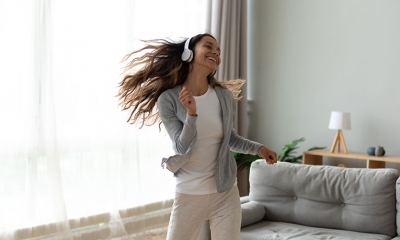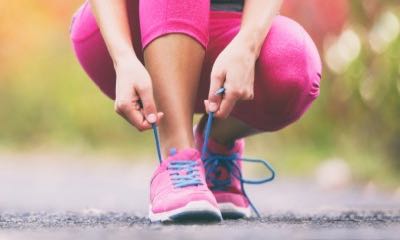Your immune system is always working to keep you healthy.
Understanding how your body protects itself gives you ammunition to fight off germs.
There are a lot of immune system myths out there about keeping yourself
healthy. Do your research to separate the fact from fiction so you
don’t fall for these immunity myths.
Start on the right path by reading this list that busts seven of the
most common immune system myths. Learn what does and doesn’t make you
sick. And discover the facts about steps you can take to stay healthy
year-round.
Immunity Myth 1: Cold weather makes you sick
Sure as the changing of the seasons, you can be certain you’ll wind
up catching something in the winter. The question is, why? People often
contract common cold viruses in cold months. So, you might believe low
temperatures are responsible for making you sick.
Not so.
A link does exist between chilly temperatures and sickness, but it is
a correlation, not a cause-and-effect relationship. Most likely the
changes in behavior associated with cold weather are what trigger these
seasonal surges.
Cold weather keeps people indoors for longer periods of time. This
leads to the spread of germs between people who are in close contact.
Think family members, co-workers, classmates, or the people with whom
you share a bus ride. Proximity to others is the primary way viruses
spread, regardless of outdoor temperature.
A similar pattern occurs when children return to school after summer break, or when you start
attending a new gym. Physical closeness to lots of people increases the chance you’ll catch a bug (whether it’s warm or cold outside.)
Some research highlights that cooler temperatures provide a better
living environment for specific viruses. Rhinovirus (the microbe
responsible for the common cold) is usually living dormant in your nasal
passages waiting for more suitable temperatures. When cooler weather
comes along, it wakes up and reproduces.
If you stay inside due to the weather, an inadvertent cough or sneeze
sends the cold virus into the air you share with others. Because colder
weather brings people closer, a sneeze might be all it takes to spread a
cold. But the temperature change was only part of the equation.
Immunity Myth 2: Seasonal allergies are a sign of a weakened immune system
The opposite is true.
Seasonal allergies
are the result of an over-reactive immune response mistaking small
particles in the air for harmful microorganisms. Consider allergies the
hallmark of an over-vigilant immune system, rather than one slacking
off.
It can be difficult to distinguish allergies from other
upper-respiratory issues. They share many of the same symptoms, but are
not contagious. You might experience a headache, congestion, runny nose,
watery/itchy eyes, or even a sore throat. All are symptoms of a cold,
too.
The difference is allergies aren’t triggered by bacteria or viruses.
Harmless particles like dust, pollen, or mold are introduced to your
body when you breathe. If you have seasonal allergies, your immune
system responds to these particles like it would a potential pathogen.
To minimize your allergy symptoms, try to identify the source of your
allergy. If it is pollen, avoid blooming plants. Dust allergies can
ramp up when it is windy outside. So, consider protecting your mouth and
nose with a mask on windy days.
These allergies are seasonal, as their name implies. That means time
will start to bring relief. Allergy symptoms can be controlled well with
proper medication prescribed by a physician. Talk to a doctor and see
if they can help you find a way to manage your seasonal allergies.
Immunity Myth 3: Handwashing “kills” viruses
You might be surprised to learn that washing your hands doesn’t
actually kill viruses. Viruses aren’t alive, which means they can’t
replicate on their own, but washing does rid your hands of viruses in
another way.
Soap adheres to the membrane, or outer wall of viruses. And soap
molecules also compete with the lipids within the virus membrane to help
pry it apart and render it harmless. This stickiness means microbes can
be rinsed away with water. When you wash your hands, you are literally
washing off the viruses that can make you sick.
If you want a refresher on how to properly wash your hands then check
out this handy guide. Proper handwashing technique is important, and
there’s more to it than you might think.
After you are done washing your hands make sure you dry them
thoroughly. It is harder for viruses to transfer from dry hands. Wash
and dry often throughout the day. Handwashing won’t kill the germs that
can make you sick, but can effectively get rid of them.
Immunity Myth 4: Hand sanitizer is more effective than handwashing

Handwashing with soap and water is the most effective way to prevent
the spread of bacteria and viruses. When handwashing is not available,
hand sanitizer is a good backup option.
Unlike handwashing, hand sanitizers do destroy microbes. The alcohol
in hand sanitizer deactivates viruses and keeps them from transferring
from your hands. Hand sanitizer made of at least 60 percent alcohol
effectively kills
bacteria and microbes on your hands.
To make the most of your hand sanitizer, try to remove visible dirt
and debris first. Wipe your hands off with a napkin or cloth before
using sanitizer to clean. Dirt and oils from your skin make hand
sanitizer less effective at killing microbes.
Hand sanitizer isn’t as effective at removing microbes as hand
washing, but it is practical. Having hand sanitizer with you is a
convenient way to clean your hands on the go. When you are out shopping
or driving in your car, you can’t always stop to wash your hands. Use
hand sanitizer in these situations to keep yourself safe from germs.
Immunity Myth 5: “Feed a cold, starve a fever”
This refrain is one of the more pervasive immune system myths. Your
body needs adequate fuel to fight off infections of any kind. Imagine
trying to fight a battle on an empty stomach. That’s how your immune
system will behave if you restrict what you eat when you’re sick.
There isn’t much evidence to support the notion that fasting reduces a
fever. In fact, your body’s calorie demands increase when you fight off
an infection. Your immune system needs energy from your diet to
increase white-blood-cell production. The rise of your internal body
temperature boosts your metabolism, too. This means you need more
calories to keep up.
However, if you’re feeling sick you might not have a big appetite.
This is completely normal. Don’t force yourself to eat if you don’t want
to. You might end up feeling nauseous.
But whether you have a cold or fever, it is important to eat what you
can when you’re sick. Stick to whole, nutritious foods if you’re under
the weather.
Many fruits, cooked vegetables, and protein are easy on the stomach and supply you with the essential nutrients your body needs. Choose those that sit well with you.
Immunity Myth 6: Chicken noodle soup will shorten your cold
As good as this sounds, a bowl of soup is not a cure of any kind.
Chicken noodle soup is, however, a time-honored comfort food.
Unfortunately, the soup itself boasts no magical healing powers—the
plumage of the chicken used to make the soup doesn’t either.
Time, rest, and appropriate medication are the only ways to defeat an infection.
That isn’t to say chicken noodle soup is a bad idea. It’s a great way
to deliciously acquire some hearty nutrition. It’s full of quality
ingredients that can help fuel your body in its time of need.
Antioxidants and vitamins from the veggies help support your immune system. And protein from chicken gives sustainable energy to aid in the fight.
Soups (and other hot meals) will help alleviate some of the symptoms
of a cold. The steam from the broth can help clear the sinuses and heat
can soothe a sore throat.
Other foods can provide similar relief. Hot tea, honey, rice,
bananas, and applesauce are palatable and can settle an upset stomach.
Try some of these foods the next time you’re feeling unwell. They won’t
cure your cold on their own, but will fill you up with the nutrition you
need to support your immunity.
Immunity Myth 7: Exercise weakens the immune system
Taking on an Olympic-style training program might throw your immune
system for a loop. But regular, low-impact exercise can do your body
good. A
habit of exercise is a reliable way to prepare your body for germs that might come along.
White blood cells flourish when you work out. Exercise increases cell
turnover in your body and stimulates the production of these important
immune cells. After all, they’re the front-line troops fighting against
viruses and bacteria.
Make it a goal to exercise for your immune health, and overall
wellbeing. Be sure not to overdo it, as too much vigorous exercise can
have a detrimental effect. Keep it simple with walking, jogging, or
swimming. Just make sure to move your body every day to support your
immune system.
Stop the Spread of Immune System Myths and Misinformation
Now that you know the false facts surrounding immunity, do your part to replace the myths with the truth.
Make sure you practice appropriate safety measures during times of
increased viral spread. Demonstrate your knowledge about immunity myths
by prioritizing exercise and eating nutritious foods to keep you feeling
strong. Teach your family and friends about the importance of
handwashing.
Bust the myths about your immune system and do what you can to
help your body stay healthy.
© 2020 Ask The Scientists. All rights reserved.
All information contained on this page is for educational purposes and intended for residents of the United States.














